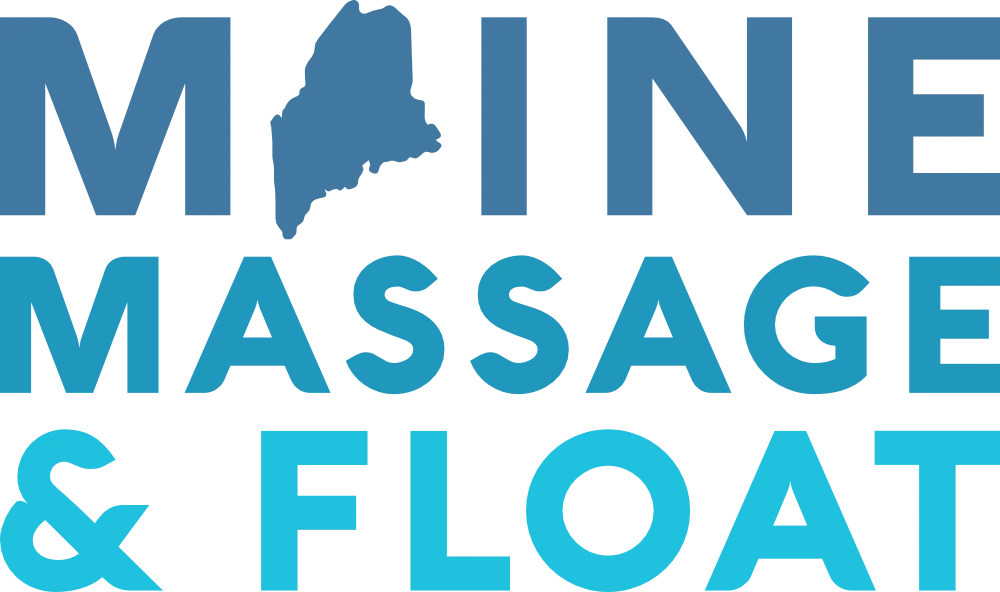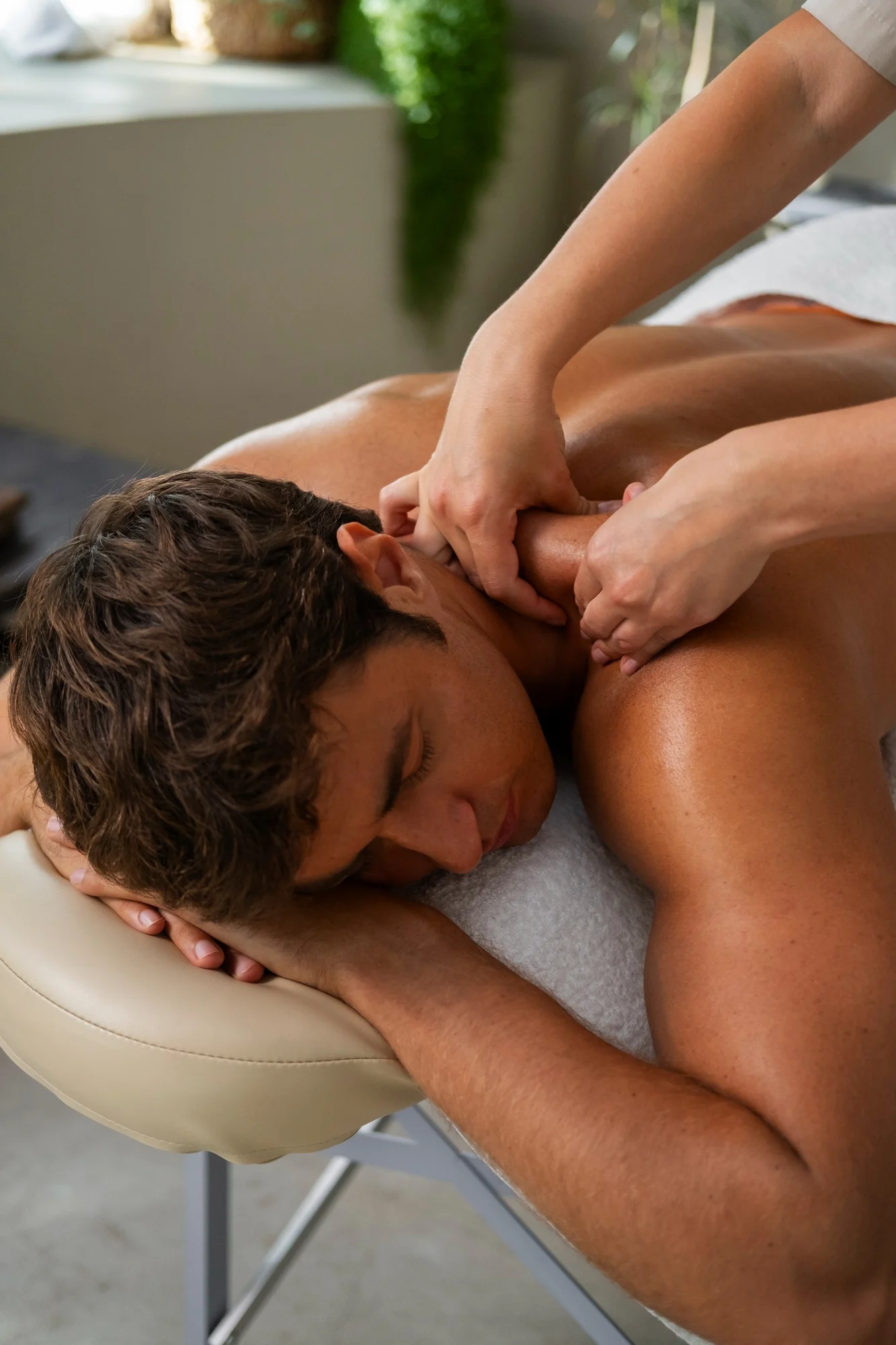Get in touch!
Ready to experience Maine’s premier massage and float therapy destination? We’d love to help you plan your wellness journey and guide you toward the services that best support your active lifestyle.
Frequently Asked Questions
Have questions about massage therapy, float sessions, or what to expect during your visit? Find answers to our most commonly asked questions below.
Massage Therapy
What should I expect during my first massage therapy visit?
Your massage therapist will require you to fill out a health history form. Afterwards the therapist will begin by asking you general questions to establish what areas you would like worked on, if there are any conditions needing to be addressed and to determine if massage is appropriate for you. Your massage therapist may perform certain assessments and testing to evaluate your condition, and to see if you have any presenting complaints.
Where will my massage session take place?
Your massage or bodywork session will take place in a warm, comfortable, quiet room. Soft music may be played to help you relax. You will lie on a table especially designed for your comfort.
What do I wear during the massage?
Depending on the primary technique your therapist uses, you may or may not need to undress. For a full body massage, most people undress completely. However, you may choose to wear underwear. Your massage therapist will give you privacy to undress, and you will be covered with a sheet and blanket (professionally draped) at all times except the area being worked on.
What do I do during a massage therapy treatment?
Make yourself comfortable. If your therapist wants you to adjust your position, she or he will either move you or will ask you to move what is needed. Otherwise, change your position anytime to make yourself more comfortable. Many people close their eyes and relax completely during a session; others prefer to talk. It’s up to you. It is your massage, and whatever feels natural to you is the best way to relax. Do not hesitate to ask questions at any time.
How will a massage feel?
It usually depends on the techniques used. Many massage therapists use a form of Swedish massage, which is often a baseline for practitioners. In a general Swedish massage, your session may start with broad, flowing strokes (effleurage) that will help calm your nervous system and relax exterior muscle tension. As your body becomes relaxed, pressure will gradually be increased to relax specific areas and relieve areas of muscular tension. Often, a light oil or lotion is used to allow your muscles to be massaged without causing excessive friction to the skin. Do not hesitate to ask questions or mention if you feel any discomfort so that the massage therapist can use another approach or technique.
Will the massage oils used make me breakout?
Most massage therapists use hypoallergenic massage oils or lotions. However, if you have sensitivity to certain types of oils or lotion please bring it to the massage therapist’s attention as most practitioners have an assortment of oils and lotions on hand.
Is a massage always appropriate?
No, there are several medical conditions that would make massage inappropriate. That’s why it is necessary that you fill out the health history forms and before you begin your session. The massage therapist will ask general health questions to rule out if you have any contraindications to massage. It is very important that you inform the practitioner of any health problems or medications you are taking. If you are under a doctor’s care, it is strongly advised that you receive a written recommendation for massage prior to any session. Your massage therapist may require a recommendation or approval from your doctor.
How long will a massage treatment last?
The average full body massage treatment lasts approximately one hour. Many people prefer a 90 minute session for optimal results. Always allow relaxation time prior to and after the session.
How will I feel after the massage therapy treatment?
Most people feel very relaxed. Some experience freedom from long-term aches and pains developed from tension or repetitive activity. After an initial period of feeling slowed down, people often experience increased energy, heightened awareness, and greater productivity which can last for days. Since toxins are released from your soft tissues during a massage, it is recommended you drink plenty of water following your massage. Massage therapists sometimes recommend a hot Epsom salt bath that encourages the release of toxins that may have been stirred up from the massage treatment.
Does insurance cover massage therapy?
In some cases, yes. We are happy to provide you with a receipt at your request that you can submit to your insurance company. We find many of our clients are pleasantly surprised to find that a percentage of their massage is covered when medically referred. Another option is to see if your employer has a MedFlex Plan. This allows pretax dollars to be set aside for many different elective therapeutic/medical services.
Massage Therapy - Code of Ethics
Client Relationships
- I shall endeavor to serve the best interests of my clients at all times and to provide the highest quality service possible.
- I shall maintain clear and honest communications with my clients and shall keep client communications
confidential. - I shall acknowledge the limitations of my skills and, when necessary, refer clients to the appropriate qualified health care professional.
- I shall in no way instigate or tolerate any kind of sexual advance while acting in the capacity of a massage, bodywork, somatic therapy or esthetic practitioner.
Professionalism
- I shall maintain the highest standards of professional conduct, providing services in an ethical and professional manner in relation to my clientele, business associates, health care professionals, and the general public.
- I shall respect the rights of all ethical practitioners and will cooperate with all health care professionals in a friendly and professional manner.
- I shall refrain from the use of any mind altering drugs, alcohol, or intoxicants prior to or during professional sessions.
- I shall always dress in a professional manner, proper dress being defined as attire suitable and consistent with accepted business and professional practice.
- I shall not be affiliated with or employed by any business that utilizes any form of sexual suggestiveness or explicit sexuality in its advertising or promotion of services, or in the actual practice of its services.
Scope of Practice / Appropriate Techniques
- I shall provide services within the scope of the ABMP definition of massage, bodywork, somatic therapies and skin care, and the limits of my training. I will not employ those massage, bodywork or skin care techniques for which I have not had adequate training and shall represent my education, training, qualifications and abilities honestly.
- I shall be conscious of the intent of the services that I am providing and shall be aware of and practice good judgment regarding the application of massage, bodywork or somatic techniques utilized.
- I shall not perform manipulations or adjustments of the human skeletal structure, diagnose, prescribe or provide any other service, procedure or therapy which requires a license to practice chiropractic, osteopathy, physical therapy, podiatry, orthopedics, psychotherapy, acupuncture, dermatology, cosmetology, or any other profession or branch of medicine unless specifically licensed to do so.
- I shall be thoroughly educated and understand the physiological effects of the specific massage, bodywork, somatic or skin care techniques utilized in order to determine whether such application is contraindicated and/or to determine the most beneficial techniques to apply to a given individual. I shall not apply massage, bodywork, somatic or skin care techniques in those cases where they may be contraindicated without a written referral from the client’s primary care provider.
Image / Advertising Claims
- I shall strive to project a professional image for myself, my business or place of employment, and the profession in general.
- I shall actively participate in educating the public regarding the actual benefits of massage, bodywork, somatic therapies and skin care.
- I shall practice honesty in advertising, promote my services ethically and in good taste, and practice and/or advertise only those techniques for which I have received adequate training and/or certification. I shall not make false claims regarding the potential benefits of the techniques rendered.
Float Therapy
What is float therapy (flotation therapy / REST)?
Float therapy—also called sensory deprivation, flotation, or REST (Restricted Environmental Stimulation Therapy)—involves floating in a pitch‑black, sound‑proof tank filled with skin‑temperature water saturated with Epsom salts, enabling effortless floating and minimizing external stimuli.
Is float therapy safe? Are there risks or contraindications?
Float therapy is generally considered safe. That said, potential drawbacks and precautions include:
- Skin irritation from the salt, claustrophobia, ear discomfort, or disorientation post-session
- It’s advised that individuals with claustrophobia, epilepsy, uncontrolled medical or psychological conditions, infectious skin issues, or who have undergone recent tattoos or chemical treatments consult their provider beforehand.
Can I fall asleep while floating?
How should I prepare for a float session?
To make your experience smoother:
- Avoid shaving at least 12–24 hours beforehand to prevent saltwater irritation
- Skip heavy meals, limit caffeine before your session, and use the restroom beforehand
How clean are float tanks?
Our float tanks are highly sanitized between sessions, using multi-stage filtration with one-micron filters, UV light, and ozone.
Visit us and enjoy
Step into our tranquil wellness sanctuary featuring skilled massage therapists and dedicated float suites. Our peaceful environment is designed for complete mind-body rejuvenation.
Portland, Maine
Conveniently located on Forest Avenue, we’ve been proudly serving the greater Portland community since 2010. Our accessible location features ample parking and easy access.
*Parking is available in our large rear lot – follow the driveway around to the right side of the building. Enter through the rear doors under the black awning and you’ll find us in Suite #201, the first door on your left.
-
Address: 980 Forest Ave,
Portland, ME 04103 - Email:info@mainemassageandfloat.com
- Voicemail/Text: (207) 590-1411
- Fax: (207) 558-8809
-
Hours:
Mon to Fri 7:00 am - 6:00 pm
Sat to Sun 9:00 am - 3:00 pm


